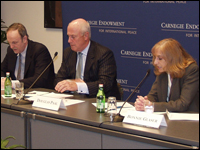Registration
You will receive an email confirming your registration.
IMGXYZ897IMGZYXThe China Program at the Carnegie Endowment hosted an event entitled “Taiwan’s New Ma Administration: A Look Ahead” on May 12, 2008. Bonnie Glaser, Senior Associate at the Center for Strategic International Studies, joined Michael Swaine, Senior Associate at Carnegie, to analyze the implications of Taiwan’s newly elected president Ma Ying-Jeou. The newly appointed director of Carnegie's China Program, Douglas Paal, moderated the discussion.
Bonnie Glaser opened her remarks with a brief outline of her prediction on Taiwan’s new policy trend toward the mainland under the Ma Administration. Improving relations with the central government in Beijing is clearly on top of Ma’s agenda, as he has absolutely no intention to continue the confrontational approach adopted by the current administration under Chen Shui Bian; rather, he is determined to end the cross-strait hostility by promoting closer trade ties and other forms of interaction between both sides. Meanwhile, Ma will also be dedicated to preserving Taiwan’s sovereignty and securing more international space from Beijing through negotiation.
On the other hand, Glaser pointed out that while Beijing is pleased with the result of Taiwan’s presidential election, suspicion towards Ma remains strong among CCP leaders. The lack of trust is apparently due to Ma’s political background as a strong anti-communist, his close ties with the U.S, and, accordingly, the concern that Ma might become another Lee Teng Hui.
However, Glaser argued that it is critical for the central government in Beijing to cooperate with Ma in improving cross-strait relations as well as in addressing other issues, because the inability to realize his promises during his first term would make Ma extremely vulnerable to political oppositions from DPP. Therefore, reciprocal actions from Beijing will reinforce Ma’s authority.
Michael Swaine then offered his expertise on the defense policy of the Ma administration, which must be assessed under the general political context across strait. The two sides have major differences over the implication of Taiwan military forces’ capability in promoting cross-strait talks: while Beijing fears that improving the capability of Taiwan’s military would create more incentives for it to seek de jure independence, Taiwan and the U.S think the exact opposite. Nevertheless, the military balance across the strait has definitely tilted toward the mainland in recent years, and Ma has pledged to restore it by increasing defense spending to 3% of GDP. However, the extent of Ma’s commitment remains unclear.
Swaine also commented specifically on the controversial sale of advanced model F-16 fighters to Taiwan's Air Force, which has yet to receive approval from the U.S government. Swaine believed that acquiring F-16s in the near term would be unnecessary for Taiwan and needlessly provocative towards Beijing. Furthermore, military officials in Taiwan should prioritize improving the country's defense infrastructure and strengthening its capability in a systematic manner, rather than acquiring one specific weapon.
Director Douglas Paal gave a brief talk at the end on Ma’s political background, and concluded that Ma is a man of strong principle, which, combined with his belief in pragmatism and procedural process, makes him a competent leader to manage cross-strait stability and improve economic performance for Taiwan.
